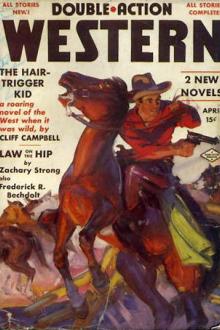The Light of the Western Stars by Zane Grey (i can read books .TXT) 📕

Read free book «The Light of the Western Stars by Zane Grey (i can read books .TXT) 📕» - read online or download for free at americanlibrarybooks.com
- Author: Zane Grey
Read book online «The Light of the Western Stars by Zane Grey (i can read books .TXT) 📕». Author - Zane Grey
Then the stirring memory of the day's adventure, the feeling of the beauty of the night, and a strange, deep-seated, sweetly vague consciousness of happiness portending, were all burned out in hot, pressing pain at the remembrance of Stewart's disgrace in her eyes. Something had changed within her so that what had been anger at herself was sorrow for him. He was such a splendid man. She could not feel the same; she knew her debt to him, yet she could not thank him, could not speak to him. She fought an unintelligible bitterness.
Then she rested with closed eyes, and time seemed neither short nor long. When Stewart called her she opened her eyes to see the gray of dawn. She rose and stepped outside. The horses whinnied. In a moment she was in the saddle, aware of cramped muscles and a weariness of limbs. Stewart led off at a sharp trot into the fir forest. They came to a trail into which he turned. The horses traveled steadily; the descent grew less steep; the firs thinned out; the gray gloom brightened.
When Madeline rode out of the firs the sun had arisen and the foothills rolled beneath her; and at their edge, where the gray of valley began, she saw a dark patch that she knew was the ranch-house.
XX. The Sheriff of El Cajon
About the middle of the forenoon of that day Madeline reached the ranch. Her guests had all arrived there late the night before, and wanted only her presence and the assurance of her well-being to consider the last of the camping trip a rare adventure. Likewise, they voted it the cowboys' masterpiece of a trick. Madeline's delay, they averred, had been only a clever coup to give a final effect. She did not correct their impression, nor think it needful to state that she had been escorted home by only one cowboy.
Her guests reported an arduous ride down the mountain, with only one incident to lend excitement. On the descent they had fallen in with Sheriff Hawe and several of his deputies, who were considerably under the influence of drink and very greatly enraged by the escape of the Mexican girl Bonita. Hawe had used insulting language to the ladies and, according to Ambrose, would have inconvenienced the party on some pretext or other if he had not been sharply silenced by the cowboys.
Madeline's guests were two days in recovering from the hard ride. On the third day they leisurely began to prepare for departure. This period was doubly trying for Madeline. She had her own physical need of rest, and, moreover, had to face a mental conflict that could scarcely be postponed further. Her sister and friends were kindly and earnestly persistent in their entreaties that she go back East with them. She desired to go. It was not going that mattered; it was how and when and under what circumstances she was to return that roused in her disturbing emotion. Before she went East she wanted to have fixed in mind her future relation to the ranch and the West. When the crucial hour arrived she found that the West had not claimed her yet. These old friends had warmed cold ties.
It turned out, however, that there need be no hurry about making the decision. Madeline would have welcomed any excuse to procrastinate; but, as it happened, a letter from Alfred made her departure out of the question for the present. He wrote that his trip to California had been very profitable, that he had a proposition for Madeline from a large cattle company, and, particularly, that he wanted to marry Florence soon after his arrival home and would bring a minister from Douglas for that purpose.
Madeline went so far, however, as to promise Helen and her friends that she would go East soon, at the very latest by Thanksgiving. With that promise they were reluctantly content to say good-by to the ranch and to her. At the last moment there seemed a great likelihood of a hitch in plans for the first stage of that homeward journey. All of Madeline's guests held up their hands, Western fashion, when Link Stevens appeared with the big white car. Link protested innocently, solemnly, that he would drive slowly and safely; but it was necessary for Madeline to guarantee Link's word and to accompany them before they would enter the car. At the station good-bys were spoken and repeated, and Madeline's promise was exacted for the hundredth time.
Dorothy Coombs's last words were: “Give my love to Monty Price. Tell him I'm—I'm glad he kissed me!”
Helen's eyes had a sweet, grave, yet mocking light as she said:
“Majesty, bring Stewart with you when you come. He'll be the rage.”
Madeline treated the remark with the same merry lightness with which it was received by the others; but after the train had pulled out and she was on her way home she remembered Helen's words and looks with something almost amounting to a shock. Any mention of Stewart, any thought of him, displeased her.
“What did Helen mean?” mused Madeline. And she pondered. That mocking light in Helen's eyes had been simply an ironical glint, a cynical gleam from that worldly experience so suspicious and tolerant in its wisdom. The sweet gravity of Helen's look had been a deeper and more subtle thing. Madeline wanted to understand it, to divine in it a new relation between Helen and herself, something fine and sisterly that might lead to love. The thought, however, revolving around a strange suggestion of Stewart, was poisoned at its inception, and she dismissed it.
Upon the drive in to the ranch, as she was passing the lower lake, she saw Stewart walking listlessly along the shore. When he became aware of the approach of the car he suddenly awakened from his aimless sauntering and disappeared quickly in the shade of the shrubbery. This was not by any means the first time Madeline had seen him avoid a possible meeting with her. Somehow the act had pained her, though affording her a relief. She did not want to meet him face to face.
It was annoying for her to guess that Stillwell had something to say in Stewart's defense. The old cattleman was evidently distressed. Several times he had tried to open a conversation with Madeline relating to Stewart; she had evaded him until the last time, when his persistence had brought a cold and final refusal to hear another word about the foreman. Stillwell had been crushed.
As days passed Stewart remained at the ranch without his old faithfulness to his work. Madeline was not moved to a kinder frame of mind to see him wandering dejectedly around. It hurt her, and because it hurt her she grew all the harder. Then she could not help hearing snatches of conversation which strengthened her suspicions that Stewart was losing his grip on himself, that he would soon take the downward course again. Verification of her own suspicion made it a belief, and belief brought about a sharp conflict between her generosity and some feeling that she could not name. It was not a question of justice or mercy or sympathy. If a single word could have saved Stewart from sinking his splendid manhood into the brute she had recoiled from at Chiricahua, she would not have spoken it. She could not restore him to his former place in her regard; she really did not want him at the ranch at all. Once, considering in wonder her knowledge of men, she interrogated herself





Comments (0)